





Headache
The headache is one of the most widespread complaints with which people see doctors. The last 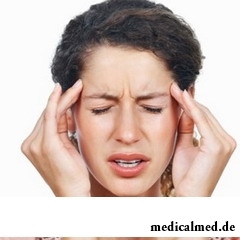 epidemiological researches show that more than 80% of adult population of the planet suffer from a headache, and at 30% from them headaches become the reason of permanent decrease in working capacity and quality of life. Headaches complicate course of many diseases, and also provoke development of vegetative frustration, a depression and sleep disorders.
epidemiological researches show that more than 80% of adult population of the planet suffer from a headache, and at 30% from them headaches become the reason of permanent decrease in working capacity and quality of life. Headaches complicate course of many diseases, and also provoke development of vegetative frustration, a depression and sleep disorders.
The headache is the leading or only complaint more than at forty different diseases: diseases of eyes, ENT organs, nervous system, pathology of kidneys and endocrine system, arterial hypotonia, depressions, neurosises and idiopathic hypertensia.
The most common forms of a headache – migraine and a headache of tension.
Reasons and symptoms of a headache
Four main reasons for headaches:
1. Organic diseases of a brain or liquorodynamic disturbances:
• volume formations of a brain (the headache is generally observed in the mornings, is combined with vomiting and nausea);
• the head injuries (acute or chronic, the general or localized) which are badly giving in to treatment;
• diseases of inflammatory character (encephalomeningitis, meningitis).
2. Vascular reasons of a headache:
• the arterial hypertension (pressing, the heavy, pulsing headache in a nape and a neck);
• migraine (the severe pulsing headache in one of half of the head, nausea, vomiting, zvuko-and a photophobia). Migraines are most often subject young women. Migraine can be also transmitted hereditarily;
3. Psychogenic reasons of a headache:
• tension is the most common form of a headache (tension headache symptoms: the constant pulling together, squeezing, gripping pains of moderate or weak intensity which do not have accurate localization and not amplifying from exercise stresses). Are caused by a mental overstrain because of chronic or acute stress.
4. Extra brain reasons:
• influence of chemicals or medicines. Substances or drugs which can cause a headache, – lead, insecticides, carbon monoxide, benzene, alcohol, caffeine, nitrates (for example, nitroglycerine), oral contraceptives;
• extra brain diseases of infectious character. Many bacterial or viral infections begin headache attacks but only other symptoms in the form of fervescence, drowsiness, lack of appetite and others join then;
• pathologies of a mouth, teeth, a nose, adnexal bosoms, ears, eyes, necks, other structures of the person and skull (at sinusitis, glaucoma);
• metabolic disturbances (dialysis, hypercapnia, hypoxia);
• cervical остереохондроз. Pain can be chronic or incidental. It is localized in cervicooccipital area and extends to eye and temporal area. People with such pathology have a constraint in muscles of a back and a neck, and also restrictions of movements in cervical vertebral department. The long exercise stress connected with overextension or a ducking, a dream in an inconvenient pose can be the reasons of such pains.
Headache diagnostic methods
As there is a lot of reasons of a headache, comprehensive inspection is necessary. It is desirable to undergo consultation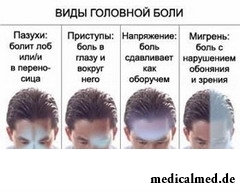 at the neurologist, the therapist, the oculist, and also, if necessary, the infectiologist and the neurosurgeon.
at the neurologist, the therapist, the oculist, and also, if necessary, the infectiologist and the neurosurgeon.
As laboratory analyses the general blood test and a lipidogramma is often applied. As a functional research dopplerography, an electroencephalography, a computer and magnetic and resonant tomography and inspections of cervical department of a backbone, and also a thyroid gland is used.
The number of researches is appointed by the attending physician, having considered all complaints of the patient and the found somatopathies.
Treatment of a headache
Treatment of a headache depends on weight and type of a headache, and also on such factors as age of the patient and others. If the headache is a symptom of other disease, it is necessary to treat the main disease.
For stopping of a headache of acuity use analgetics – non-steroidal anti-inflammatory drugs – an ibuprofen, paracetamol, and also drugs on their basis with caffeine addition (Panadolum, Pentalginum, солпадеин, ношпалгин), spasmolysants. Medicines can independently be used only one-time, abuse of analgetics can cause a set of side effects – disturbances in work of digestive tract, kidneys, a liver.
For treatment of a headache are also used gabapentina, Valproatums, muscle relaxants, group B vitamins, sedative drugs, neuroprotectors, diuretics, antioxidants, vascular drugs and physical therapy.
How to kill a headache
At a headache it is undesirable to have coffee, it is better to use tea as coffee can kill pain only for some time, and further pain is returned with the doubled force.
How to kill a headache by national methods? To kill a headache, according to traditional medicine, the cabbage leaf can help. It needs to be lowered for a minute in boiled water, to dry up, cool and impose on whisky, a forehead or a nape (depending on that, you feel pain where exactly). Further it is possible to drink freshly brewed tea with leaflets of mint and honey (honey contains magnesium and potassium which improve blood circulation and, thereby, remove stress in arteries).
Other national methods:
• To drink the apple cider vinegar divorced in a glass of water;
• Aromatherapy: to rub one or two drops of essential oils of rosemary or a lavender in whisky;
• Menthol ointment. To smear a forehead or temples;
• Light massage of the head: the stroking movements it is necessary to walk from a front zone to occipital area. Further from a darkness down to ears, from the top to a nape and smoothly fall to a neck. To complete quiet massage of a cervical and collar zone;
• Very effective and known remedy for removal of a headache is asterisk balm;
• Dream. Rest and darkness considerably will help to relieve a headache;
• Lemon crusts. To clear internal parts of a lemon crust of white pulp and to put to temples. Over time in temples there will be a pruritic reddish spot and the headache will pass.
Having fallen from a donkey, you more likely will kill yourself, than having fallen from a horse. Only do not try to disprove this statement.
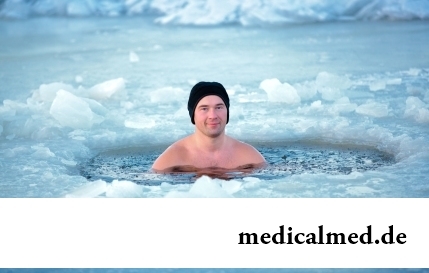
The winter swimming in open reservoirs called in our country by "winter swimming" – officially recognized sport and one of the ek...
Section: Articles about health
No, probably, the person who would not have cold. Cold, cough, a headache – these symptoms are known to everyone. The peak of catarrhal diseases is the share of fall. SARS already came to schools and kindergartens, flu slowly makes the way to the cities, in a word, з...
Section: Articles about health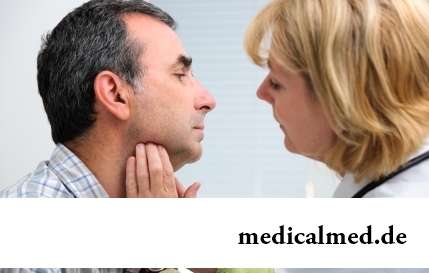
The endocrine system carries out extremely important role in a human body, practically all processes of life activity are regulated by it. Closed glands (hemadens) produce special biologically active agents – hormones which then get to a blood channel and are transferred to bodies addressees, or as they are called still, to target organs. Frustration of this mechanism are fraught with development of serious chronic pathologies....
Section: Articles about health
What will only not be thought up by persons interested to have a beautiful figure. Here the last innovation – for weight loss needs to be eaten greasy food. Give ра...
Section: Slideshow
Frosty air, fresh wind and easy snowball at most of Russians are associated with cheerfulness, health and cheerful entertainments on which our winter is so generous. But, unfortunately, cold season sometimes brings also troubles with health. It is not about a season...
Section: Articles about health
Smack in a mouth can arise in the natural way – as a result of lack of morning hygiene or reception of the corresponding food. However in certain cases its existence is a sign of certain pathologies, and allows to reveal an illness at an early stage. Depending on character of aftertaste – acid, salty, bitter, sweet – distinguish also diseases which accompany it....
Section: Articles about health
Maternal milk is the best food for the newborn. It is the unique natural product containing optimum set...
Section: Articles about health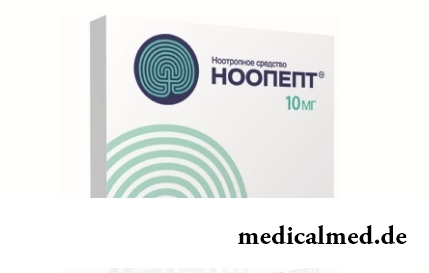
Many of us, probably, noticed more than once that from intellectual loadings at some point the brain as though "overheats" and "assimilation" of information is strongly slowed down. Especially this problem urgent for persons of age becomes more senior than fifty years. "It is already bad with...
Section: Articles about health
The pancreas performs two functions in a human body: release of enzymes without which digestion of carbohydrates, fats and proteins, and a producing hormones is impossible. The most important of them - insulin, is the main participant of carbohydrate metabolism normalizing processes of education and utilization of glucose, the main energy source for an organism....
Section: Articles about health
You heard that laughter prolongs life? To establish longevity direct link with sincere fun to researchers yet not удалос...
Section: Articles about health
For anybody not a secret that the modern person eats not as his ancestors. For the last 100 years in broad access there were absolutely new products which are result of use of the latest technologies in food production. Significantly changed спо...
Section: Articles about health
Ayurveda - the most ancient tselitelsky practice which came to us from India. It represents the doctrine about maintenance of physical, psychological and moral health of the person by means of the complex of procedures including a diet, cleaning of an organism, breathing exercises, massage, and in case of a disease - and medicinal therapy. The healers practicing Ayurveda assign very important part to spices, and at the heart of Ayurvedic drugs, as a rule, there are they. It is considered that spices not of t...
Section: Articles about health
Cellulitis - very widespread cosmetic shortcoming which arises approximately at 80% of women sooner or later. Emergence ег...
Section: Articles about health
Is told about advantage of domestic animals for development of the child much. But many parents nevertheless do not hurry to bring pets as are afraid that they can do harm to health of children. What troubles can really trap kids and how to make with...
Section: Articles about health
The pine is one of the most widespread plants of our woods. Its needles and pitch not without reason called by "gallipot" were since ancient times used for strengthening of protective forces of an organism, treatment of avitaminosis, anemia and many other diseases. In recent years wide popularity was gained by the national medicines prepared from pinecones. "Fruits" of a coniferous tree contain a huge amount of vitamins, biologically active agents, antioxidants, phytoncides and other useful to...
Section: Articles about health
The drugs stopping or oppressing life activity of pathogenic microorganisms are widely applied in clinical practice with 4...
Section: Articles about health
We present to yours the TOP of the medicamentous means exerting the stimulating impact on a potentiality, i.e. on ability of the man to commission of sexual intercourse. At once it is necessary to tell that not always disturbances of erectile function can be eliminated with reception of t...
Section: Articles about health
All got used long ago that, having addressed the plastic surgeon, it is possible to modify natural parameters of a figure or to minimize the damages put to appearance with ruthless time. Many people (preferential women) worldwide annually decide on operations such. However there are also much more exotic interventions which are carried out seldom so far and cost expensive very much. We bring the story about the most unusual of them to your attention....
Section: Articles about health
The medicine promptly develops, and the fact that else quite recently it seemed by miracle can now. We are not surprised any more to the fact that sport...
Section: Articles about health
Food with the increased content of sugar is attractive to most of people - it is scientifically confirmed fact. Business here not in intemperance or dissoluteness: the sweet food is associated since childhood with feeling of rest and safety which is felt by the kid, to...
Section: Articles about health
Sometimes it seems that modern society was divided into two camps: representatives of the first are sure that only the woman has to be responsible for contraception, representatives of the second, respectively, are sure that it is destiny of men. Meanwhile the question of contraception has very many aspects – both psychological, and legal and, of course, medical....
Section: Articles about health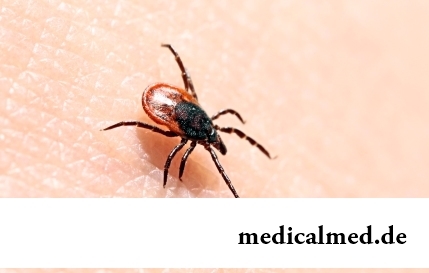
Tick-borne encephalitis – one of the most dangerous viral diseases which causative agents transfer and is given to people by ixodic mites. Эт...
Section: Articles about health
Traveling all over the world, many try to try the most exotic dishes of national cuisines. There is even a so-called gastronomic tourism which, according to gourmets, not only allows to receive new feelings, but also is capable to show life the friend...
Section: Articles about health
New year, wedding, birthday, office party – an occasion to drink at the Russian person will always be. How to reduce a negative impact of alcohol by an organism and to avoid a condition of strong intoxication? The most correct council – to refuse the use of alcoholic drinks. Council is true, but not always feasible. We offer several advice which will help you in cases when it is impossible to avoid alcohol intake....
Section: Articles about health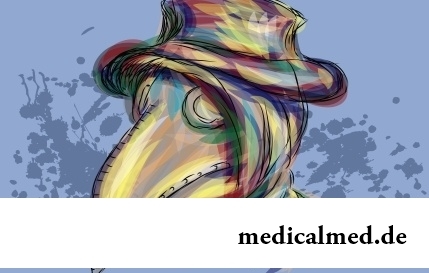
History of mankind contains several tens of epidemics whose emergence was compared by eyewitnesses and historians to doomsday. With...
Section: Articles about health
A lot of things depend on a condition of a backbone in a human body, a backbone - not only a support for a body, it also a receptacle for a spinal cord, that is why malfunctions with a backbone are so dangerous. To treat rachis diseases very difficult and long...
Section: Articles about health
Energy saving lamps are one of the most popular products of innovative technologies, and there is no wonder: they much more economic also are more long-lasting than usual filament lamps. At the same time there are fears that energy saving bulbs can become the reason of emergence of problems with health. Unfortunately, some of similar opinions have the real reasons....
Section: Articles about health
